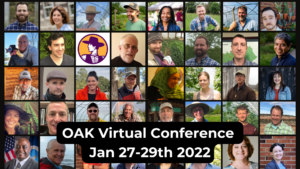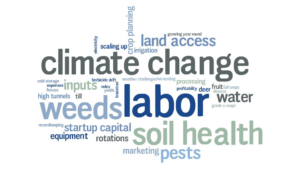Final report for SKY21-001
Project Information
Dr. Tim Woods is the UK State Coordinator and Brett Wolff is the Kentucky Program Assistant. In addition to his leadership of the program, Dr. Woods has brought expertise in the areas local food marketing systems, small farm decision making and specialty crop economics. Brett continues to act as a networker for the program, identifying new opportunities for collaboration and new venues to share SSARE resources. In our proposed programming this year, we have decided to focus on supporting a program that helps agriculture outreach providers to support Recovery Gardens, and to help agents expand their capacity for identifying and supporting producers who may need and qualify for AgrAbility support. We also plan to support agriculture outreach providers and producer leaders in seeking professional development through our Sustainably Agriculture Professional Development Fellowships. While the bulk of programming costs associated with the Third Thursday Thing are included in the Kentucky State University proposal, we do provide support to their monthly workshops and the program assistant supports both programs.
Recovery Gardens
A key component of our approach is the establishment of a formal peer support network for local Extension educators across the ANR-FCS divide who are interested in or involved in this type of work to facilitate problem-solving and the implementation of best practices, while also building much-needed social support. While this program funding is focused on training agents, there will be behavior change for participants as well. The project builds on a successful pilot project spearheaded by the Nutrition Education Program; programs have been established in eight counties over the last three years and evaluation results indicate that participants increased their fresh vegetable consumption (an average of 67% percent change at program exit). Furthermore, by exposing socially disadvantaged individuals to gardening, the program motivates those in recovery to consider establishing a future career in small-scale, sustainable agriculture.
KSU’s target audience is a blend of Extension, NRCS, research, and governmental personnel. We also place strong emphasis on professional development of producer leaders in the community who are poised to share the information learned at the Third Thursday Thing with many of their neighbors. We engage in Focus Group feedback throughout the year, and we collect and analyze attendance data to ensure that we are recruiting a balanced group of attendees. For the UK portion, our focus is on developing the capacity of our technical assistance professionals in the state. In our experience these groups do not have abundant funding to support their continued professional development in the field of sustainable agriculture. The main objective of these efforts is for these professionals to acquire knowledge, skills, and networks that allow them to better serve their clientele.
AgrAbility Professional Development Expansion
Extension agents and other participating ag outreach providers will be able to identify clients who may be able to benefit from AgrAbility programs. Participants will then be able to coordinate with state-level specialists to provide the right kind of support to this often-underserved group of clients.
Professional Development Fellowships
Extension agents and other participating ag outreach providers will gain knowledge about sustainable agriculture practices including production and marketing, and will make plans to apply that knowledge to the farm enterprises they support. Participants will also gain a deeper understanding of how governmental, university, and nonprofit entities might better collaborate to support sustainable agriculture in Kentucky. We will ask attendees to complete a reflection and evaluation indicating how they plan to use the information they learn.
Advisors
- (Educator and Researcher)
- (Educator)
- (Educator)
- (Educator)
- (Educator)
- (Educator and Researcher)
- (Educator and Researcher)
- (Educator)
- (Educator)
- (Educator)
- (Educator and Researcher)
- (Educator)
- (Educator)
Education
Due to ongoing restrictions and public hesitance around gathering in the midst of the ongoing COVID-19 pandemic, much of our programming remained virtual and in providing indirect support to ongoing initiatives. These included workshops, working groups, and committees developing needed sustainable agriculture trainings for ag service providers and farmer leaders.
Education & Outreach Initiatives
To engage the certified organic growing and marketing community in focused conversations and educational lectures.
The program provided 120 scholarships to support ag outreach providers and farmer-leaders to attend the 2022 OAK Virtual Conference.
https://www.oak-ky.org/conference-agenda-virtual
NOTE: this includes SSARE regional travel funds, but required considerable Program Assistant time to organize and execute.
| Aspiring Farmers | 24.32% |
| Home Gardener | 35.14% |
| Farming <5 years | 29.05% |
| Farming 6-10 years | 9.80% |
| Farming >10 years | 14.86% |
| Students | 10.81% |
| Veteran | 4.05% |
| Local Food Advocate | 17.23% |
| Farmland Owner | 5.41% |
| Wholesale | 1.69% |
| Extension | 9.46% |
| Research | 11.49% |
| BIPOC | 16.22% |
From OAK Director: "The entire OAK team and wider community sends deep appreciation. In total the 2022 OAK Conference Series engaged 686 attendees and made 394 scholarships available. We would not have been able to deliver that level of educational impact without KY SARE support and your advocacy and stewardship through the process."
To intentionally engage the certified organic growing and marketing community in Western Kentucky and to host regionally-focused conversations and educational lectures.
The program provided 45 scholarships to support ag outreach providers and farmer-leaders to attend.
https://www.oak-ky.org/conference-agenda-western
NOTE: this includes SSARE regional travel funds, but required Program Assistant time to organize and execute.
| Apsipring Farmers | 16.00% |
| Home Gardener | 10.00% |
| Farming <5 years | 20.00% |
| Farming 6-10 years | 18.00% |
| Farming >10 years | 28.00% |
| Students | 4.00% |
| Veteran | 2.00% |
| Local Food Advocate | 8.00% |
| Farmland Owner (non-operator) | 2.00% |
| Wholesale | 2.00% |
| Extension | 2.00% |
| Research | 8.00% |
| BIPOC | 24.00% |
To inform Kentucky Extension agents about the SARE Program, the available print and online resources, and the on-farm grant opportunities available.
Program Assistant spoke with 150 agents about the SARE program offerings in a 3-part, regionally-focused series of workshops.
Agents learned about the SARE program and opportunities available AND identified direct meat marketing as a key concept that needs more support (see below).
To better coordinate and organize ag outreach providers working on local food issues in Kentucky.
This group started under the initial uncertainties of the COVID-19 pandemic and has continued with monthly meetings through this reporting period. Program Assistant has used these opportunities to share more about the SARE program and continue identifying needs for professional development and educational support from the program.
Several group members have applied for regional-level support, and direct meat marketing and farm succession planning were identified as target areas for program development.
To set up a structured training for agents and other ag service providers detailing how they can support their farmers and communities as they consider inter-generational farm succession and transition.
In conference with Drs. Nichole Huff and Steve Isaacs at UK, we have identified several topics and potential speakers for a series forthcoming this year.
- Dr. Dave Kohl (Virginia Tech): Seeing the Bigger Picture: Farm & Economic Outlook
- Kevin Ferguson (UT Extension): Farm and Management Transition Planning
- Dr. Nichole Huff (UK Extension): Estate Planning Basics: Farms, Families, and Fallouts
- Dave Marrison (Ohio Extension): Communication & Farm Management Transitions
- Clint Quarles and/or legal panel: Legal Tips for Farm Transitions
These conversations are just preliminary but programming will include an evaluation component.
To set up a structured training for agents and other ag service providers on the basic principles of direct meat marketing.
The COVID-19 pandemic brought renewed interest in local meat as well as funding for additional processing capacity and other market expansions. Educational support has lagged behind this interest. Program Assistant convened a small group of involved ag outreach providers to discuss what this programming might look like.
Potential topics include:
Customer Service
o Customer Service for prep/understanding cuts
o Be careful with words you use, stay on messaging
o Justifying Price Points to Customers
· Media Outlets
o Social Media
o Videos
o Local Radio/Media
o Print advertisement
o Other forms
o Crackdown on meat on social media
· Business Planning
o Business planning intensive with KCARD
o Requirements/Permits
o Calculating % return on retail products
o Sample Budget with across the state
o Initial Cost considerations
o How much meat can I expect?
o Maintaining relationship with processor
o Developing an Initial price list
· Marketing
o Marketing underutilized cuts focus
o Level of marketing commitment that you need to commit depending on product
o Real Talk: Marketing Costs, Time, & Energy
o Communicating the value of your product
These conversations are just preliminary but programming will include an evaluation component.
Educational & Outreach Activities
Learning Outcomes
Project Outcomes
Face of SARE
Kentucky’s SARE PDP program objective is to build a broad base of interest and skills in agricultural sustainability among extension agents and other professionals in the state, equip them with the needed skills to assist farmers, marketers, and community leaders, and to facilitate a diverse range of collaborative projects. The way that we manage our programs has led to strong partnerships with the Kentucky Department of Agriculture, NRCS, FSA, Community Farm Alliance, Kentucky Center for Agricultural and Rural Development, the Cooperative Extension Service, Grow Appalachia, as well as grower groups across the state
Our Program Assistant continues to serve as one of the primary faces of the KYSARE program. He networks extensively across the state and beyond to identify new partners and new ideas for amplifying our financial investment. The core job of KY SARE’s Program Assistant is coordinating all of the SARE-promoted trainings and programs. This includes working with the content providers (faculty, private sector, government, NGO) and SARE leadership to develop effective programs. He provides logistical support (finding meeting space, arranging travel, access to materials) and assisting program evaluation.
The Program Assistant also manages the SARE grant funds, helping with budgets, arranging for reimbursement and overall management. Because sustainable agriculture programs in Kentucky extend much beyond the SARE-supported programs, the program assistant actively participates in other activities. This includes attending extension and grower events where he simultaneously represents KYSARE and the UK Center for Crop Diversification, allowing him to provide SARE resources anywhere they might be helpful and relevant. His engagement and connections markedly enhance the visibility of the SARE Program. He is actively involved in Kentucky State University’s “Third Thursday Thing”—monthly sustainable ag field days covering a wide range of topics. The current Program Assistant has strong networking and leadership skills that help us build productive partnerships with Farm Services Agency, Kentucky Department of Agriculture, and numerous NGOs. The program assistant also oversees reporting and proposal development.

